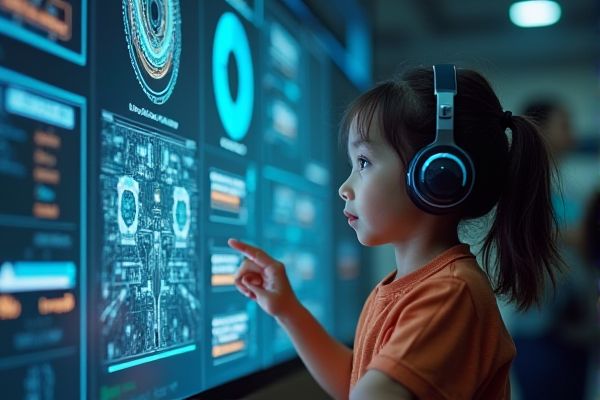
AI enhances personalized learning experiences for children by adapting educational content to individual needs, ensuring they grasp concepts at their own pace. Intelligent tutoring systems provide real-time feedback, identifying strengths and weaknesses, which helps educators tailor their teaching strategies. Interactive AI-driven tools promote engagement through gamified learning, making education more enjoyable and stimulating for young minds. Furthermore, predictive analytics in education helps identify at-risk students early, allowing for timely interventions to support their academic journey.
AI usage in child education
Personalized Learning
AI in child education offers the potential for personalized learning experiences tailored to individual student needs. For instance, platforms like Khan Academy use AI algorithms to adapt lessons and practice questions based on a child's performance. This customization can enhance student engagement and improve educational outcomes by addressing unique learning styles. The integration of AI tools presents opportunities for teachers to focus more on facilitating learning rather than manual assessments.
Intelligent Tutoring Systems
AI usage in child education, particularly through Intelligent Tutoring Systems (ITS), opens up the possibility for personalized learning experiences. These systems can adapt to individual student needs, potentially improving engagement and understanding of complex subjects. For instance, platforms like Carnegie Learning provide tailored math instruction, demonstrating the effectiveness of AI in educational settings. This adaptation can lead to better academic outcomes and a greater chance of student success.
Gamified Learning Experiences
AI can enhance child education through gamified learning experiences by adapting content to individual learning styles. For instance, platforms like Kahoot! utilize game mechanics to engage students while assessing their understanding in real-time. This approach can increase motivation and improve retention rates among children. The chance for personalized feedback also allows educators to address specific learning gaps more effectively.
Real-time Feedback and Assessment
AI can provide real-time feedback and assessment in child education, improving learning outcomes. For instance, personalized learning platforms like DreamBox Learning adapt to a child's pace, offering tailored exercises and progress tracking. This immediate response helps educators identify areas needing attention, potentially enhancing student engagement. The integration of AI tools may also streamline administrative tasks, allowing teachers to focus more on instruction.
Language Learning Support
AI can enhance child education by providing personalized learning experiences tailored to individual needs. For instance, language learning apps like Duolingo utilize AI algorithms to adapt lessons based on a student's progress. This customization can lead to improved language retention and engagement among young learners. The possibility of using AI-generated feedback may give educators insights into student performance and areas requiring additional support.
Equal Access to Resources
AI in child education has the potential to enhance personalized learning experiences, catering to individual student needs. For example, platforms like DreamBox Learning provide adaptive math lessons that can better engage students. Equal access to AI resources could bridge educational gaps, allowing underserved communities to benefit from technology-driven learning. This integration may improve overall academic performance and foster lifelong learning skills.
Interactive Storytelling
AI in child education enhances interactive storytelling by creating personalized narratives that cater to individual learning styles. For instance, an educational platform like Epic! utilizes AI to recommend stories based on a child's reading level and interests. This tailored approach increases engagement and helps develop critical thinking skills. The possibility of fostering a love for reading through adaptive storytelling presents a significant advantage in supporting a child's academic growth.
Data-driven Insights on Student Progress
AI can enhance child education by providing personalized learning experiences tailored to individual needs. Data-driven insights on student progress can help educators identify strengths and weaknesses, facilitating targeted intervention strategies. For example, institutions like XYZ Academy might utilize AI tools to track student engagement and performance patterns. This approach increases the likelihood of improving educational outcomes and ensuring better resource allocation.
Social Skills Enhancement Tools
AI can provide personalized learning experiences in child education, adapting to each student's unique pace and style. Social skills enhancement tools, such as interactive AI-driven games, can foster cooperation and communication among children. These technologies offer the potential to improve engagement and retention of information in educational settings. Research from institutions like Stanford University indicates that integrating AI in classrooms may lead to improved academic outcomes and social interaction skills.
Curriculum Adaptation and Enhancement
AI can facilitate customized learning experiences for children by analyzing their strengths and weaknesses. Tools like intelligent tutoring systems provide tailored feedback, enhancing individual learning outcomes. For example, a school district could implement AI-driven software to adapt the curriculum based on student performance data. This personalization could lead to improved engagement and comprehension among students.
 techknowy.com
techknowy.com